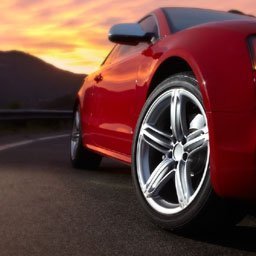 You’ve probably noticed that some tires seem to make
more noise than others. Keep in mind that all tires will
generate some level of sound as they come in contact with the road
surface. There are a few key factors that can impact the amount
noise produced from tires.
You’ve probably noticed that some tires seem to make
more noise than others. Keep in mind that all tires will
generate some level of sound as they come in contact with the road
surface. There are a few key factors that can impact the amount
noise produced from tires.
Tread Design
The design of a tire’s tread can
significantly impact the ride quality and noise produced. Wide
block or more aggressive tire treads generally create a louder
ride. Tire manufacturers are continually working to design
tires that will provide excellent traction and yet deliver a safe
and comfortable ride.
As an example, the Michelin Primacy MXV4 uses “computer-optimized design and precision manufacturing to reduce vibrations and road noise”. Furthermore the “MaxTouch Construction maximizes the tire’s contact with the road and evenly distributes the forces of acceleration, braking and cornering, resulting in longer wear.”
Continental’s CrossContact LX tire has an innovative tread design which minimizes noise and provides a comfortable ride. “Thanks to their rib characteristic and pronounced siping, the three circumferential block rows make for precise steering response and very good straightline performance while guaranteeing that the tire rolls very smoothly and quietly.”
Tire Materials
Advances in synthetic rubber compounds,
new materials and technology are all being used by tire
manufacturers to improve the quality of tires. Some materials are
used in tires specifically to reduce the rolling resistance. Most
performance and touring tires are constructed with different
reinforcement materials that tend to provide a quieter ride.
A good example of material technology is the Bridgestone Turanza Serenity Plus tire. The tires are designed using what Bridgestone calls RENOA silencer grooves. These “resonance noise attenuated” silencer grooves help reduce pattern noise by trapping sound in tread pattern elements.
Also, the Goodyear Assurance ComforTred Touring rates high for a quiet and comfortable ride. A “special comfort layer in the tread helps provide, on average, 20% more cushion than standard passenger tires”.
Tire Wear
As a tire wears you may notice more noise
produced. One factor may be uneven tire wear. Uneven tire treads
will not uniformly come in contact with the road. As a result, you
may notice more noise, steering wheel vibration, or a pattern sound
as you speed up and slow down. Routine tire care –
maintaining proper tire pressure, tire rotations and alignment will
help to alleviate this issue.
In addition to proper maintenance, the best way to reduce the chance of having “loud tires” is to ask questions. There are many tire brands and models which are designed to minimize noise. We have only suggested a few tires above as references. Stop into any of our store locations and we can help you determine the best tires for your needs.
